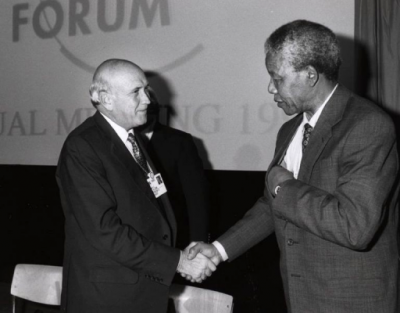South Africa: The End of Apartheid in 1990
1990
A policy which endured in South Africa from the late 1940s to the early 1990s, apartheid was a system of institutionalized racial segregation whereby blacks, Indians, and Asians were treated as second class citizens. A series of popular uprisings and protests were met with the banning of opposition and imprisoning of anti-apartheid leaders, most notably popularist Nelson Mandela in 1964.
Events came to a head in January 1985 when President Botha said that he was willing to release Mandela on one condition: Mandela was to pledge opposition to acts of violence as a way of furthering political objectives. Mandela's reply was read in public by one of his allies - his first words distributed publicly since his sentence to prison twenty-one years previously. He described violence as the business of the apartheid regime; with democracy there would be no need for further bloodshed. The crowd listening to the reading of his speech erupted in cheers: without even being present in person, Mandela’s endorsement of non-violence had exposed the methods of apartheid leaders as brutal.
Reforms to apartheid in the 1980s failed to quell the mounting opposition, and in 1990 President Frederik Willem de Klerk began negotiations to end apartheid. These negotiations culminated in multi-racial democratic elections in 1994, which were won by the African National Congress under Nelson Mandela.
